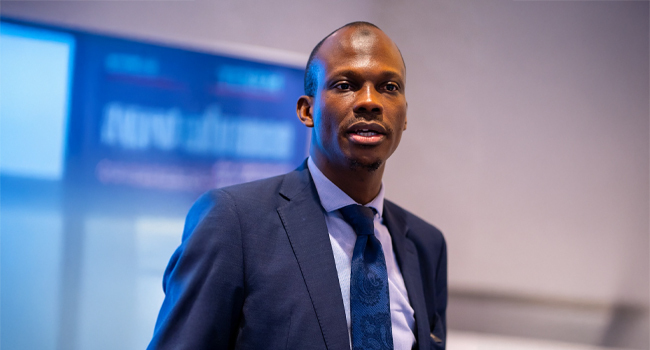
Governance accountability group, BudgIT, describes itself as, “A civic organisation that uses creative technology to simplify public information, stimulating a community of active citizens and enabling their right to demand accountability, institutional reforms, efficient service delivery and an equitable society.”
The organization niftily provides a caveat, stating it’s perspectives “reflect our analytical views that we believe are reliable and fact-based.” It however significantly disowns responsibility or liability for any factual or contextual errors in the reports it puts in the public space. As red flags go, this one, however, is robbed in respectability.
In BudgIT words: “Whilst reasonable care has been taken in preparing this document, no responsibility or liability is accepted for errors or any views expressed herein by BudgIT for actions taken due to information provided in this Report.”
BudgIT stresses it uses “creative technology” to harvest, analyse, and deliver information. What really is creative technology? First, it must not miscommunicate or obfuscate. Creative technology presupposes a broad interdisciplinary and transdisciplinary field combining computing, digital product design, digital media, art, and the humanities, leveraging electronic and/or data-driven engine.
A creative technologist (or creative technology group) develops and trains the design engineering team to ensure the delivery of quality or credibly designed products or services. The tech guru/group is able to manage multiple projects concurrently and is also a strong communicator who is able to present ideas and concepts to both technical and non-technical audiences accurately.
By limiting the metrics that feed its statistical data which provides the informatics driving its analytical conclusions, BudgIT simply puts incorrect information (miscommunication) into the public space and this has deleterious consequences for the subnational entities it claims it is trying to assess. This shockingly equates willful demarketing.
And this precisely what BudgIT has inflicted (or believes it has) on the current, less than two-year old progressive administration of Governor Ahmed Aliyu Sokoto of Sokoto State and arguably, several other states. And ignoring is perilous for several reasons.
In it’s 2024-Q3 States Fiscal Transparency League (SFTL) Table which BudgIT states track fiscal transparency among Nigerian states, the organization simply took Sokoto State and its government to the cleaners asserting rather uninformedly that the state came last in its rankings for the stated period. The organization also ‘attacked’ Nasarawa and Gombe states for ‘ranking low’. But that’s another story.
Pray, what really are the metrics from which BudgIT’s conclusions flow – mostly which enthusiastically hangs its victims in their absence? According to BudgIT’, it’s evaluation assessed the availability and completeness of critical fiscal documents, the functionality of state websites and e-Procurement portals, and the timeliness of their publication. It further speaks about the enhancement of the state’s e-procurement portal’s usability and accessibility.
A core dimension, in effect, of measuring fiscal governance transparency is the mere uploading of information on the state’s website. There was absolutely no effort by BudgIT to directly interface or engage and interrogate the target entities, Sokoto State specifically, before churning out critical reports.
For instance, how would BudgIT know that for the less than two the Governor Ahmed Aliyu’s administration has been in power, it has not borrowed one kobo in driving its compelling 9-point smart development agenda?
Clearly, BudgIT’s approach oversimplifies a tracking/ranking project that has the potential of seriously undermining a state’s hard-earned credibility and genuine efforts at courting local and offshore investments. It also deliberately understates fundamental governance changes afoot in the state and creates a negative media feeding frenzy. This procedure has a credibility issue as it will be played up shortly.
If the organization must be taken really seriously, BudgIT must of necessity go beyond clustering over ICT tools in cosy offices, over warm coffee, harvesting online data with whimsical templates, and ranking subnational entities – many of which are delivering commendable governance impact without being noisy about it.
Another dimension that many hardly consider is that in actuality, private groups, however well-intentioned, cannot hijack the job of Public Account Committees of the State Houses of Assembly or the National Assembly.
The financial governance of sub-nationals can not be subjected to the whimsical scrutiny of private NGOs who, in themselves, hardly come out smelling like roses when their funding sources, tax status and financial governance are interrogated.
In actuality, no state legislation compels the presiding state chief executive to subject his administration’s budgetary processes to the unscientific scrutiny of the private groups who may have untoward agenda. More importantly, the transparent administration of any state budget is not determined by BudgIT’s quirky ranking.
Moving ahead, beyond BudgIT’s ranking in Q3 2024 State Fiscal Transparency League, Sokoto State has been actually documented as a leading example in fiscal transparency. In a recent assessment by the World Bank’s States Fiscal Transparency, Accountability, and Sustainability (SFTAS) Programme, Sokoto ranked first in the country. This ranking was based on rigorous criteria, including the publication of fiscal documents, accessibility of budget information, and implementation of sound financial management practices.
The BudgIT ranking for 2024 Q3 contradicts this established recognition without providing sufficient context or clarity about its methodology. BudgIT must then consider rejigging its tech template to align with 21st-century analytical trends.
Sokoto State has consistently published all relevant fiscal documents, including audit reports, budgets, budget implementation reports, and accountant-general reports, on its Ministry of Finance website. This ensures public access to crucial information, fostering transparency and accountability. The state’s website is regularly updated and structured to provide easy navigation for stakeholders, including citizens, businesses, and development partners.
It may Nigerians that contrary to the claims in the BudgIT report, Sokoto State operates a fully functional e-procurement platform. The platform is designed to enhance transparency in public procurement by publishing all procurement details, allowing for public feedback, and ensuring fair competition. The platform aligns with international best practices and serves as a critical tool for minimizing corruption and inefficiencies in public resource management.
Under the SFTAS Programme, Sokoto State has implemented key reforms to enhance fiscal transparency and accountability. These include publishing budget implementation reports and audited financial statements promptly, adopting a citizen-friendly budgeting process to involve the public in financial planning and execution; and strengthening internal control mechanisms to ensure prudent resource management.
In addressing socio-economic challenges, the online publication’s effort to link Sokoto’s fiscal transparency ranking with its poverty index and insecurity challenges is misleading and a curious oversimplification.
Sokoto State, like several others in Nigeria, faces significant security challenges due to banditry and terrorism. However, these challenges have not deterred the state government from prioritizing fiscal transparency and accountability. The state has invested heavily in addressing insecurity while simultaneously implementing social welfare and poverty alleviation programmes to uplift its citizens.
Worse, comparing Sokoto State with other states without considering differences in historical context, security challenges, and economic base is inherently flawed. States with fewer security challenges and more stable economic conditions naturally have an advantage in implementing certain governance practices. Despite its unique challenges, Sokoto has demonstrated remarkable resilience and progress.
In effect, Sokoto State recognizes that transparency and accountability are essential for sustainable development and the current administration under the leadership of Governor Ahmed Aliyu remains committed to enhancing public financial management systems, ensuring every naira spent delivers value to the citizens.
Meanwhile, efforts to digitize financial processes, adopt global best practices, and engage stakeholders in governance reflect the state’s unwavering dedication to transparency. For emphasis, Sokoto State is an entity with a high level of fiscal transparency and accountability, as demonstrated over the years, which earned its national recognition.
For instance, using the indices and indicators of fiscal transparency; it would interest the public to note that Sokoto State is known for prompt preparation and submission of its proposed budget to the State House of Assembly for approval. This is mostly published on our state website before the end of the preceding fiscal year to enable citizens’ accessibility.
The states approved budget published are published on the state’s website in the first month of the new fiscal year (January) and its Citizens’ Budgets are also published and accessible on the state’s official website between the end of Q1 to mid Q2 of the new fiscal year.
Sokoto State’s Budget Implementation Reports (BIR) are summarized and published immediately after the end of each quarter and its Audited Financial statements are published even before the end of the 2nd quarter of the succeeding fiscal year.
It is crucial to rely on accurate and comprehensive data when assessing state performance. Sokoto State remains a beacon of fiscal transparency and accountability in Nigeria, as evidenced by its achievements under the SFTAS Programme. The state government is committed to continuous improvement, ensuring that governance serves as a tool for development, equity, and social progress.
•Viewpoint expressed in this article is mainly that of the writer.






